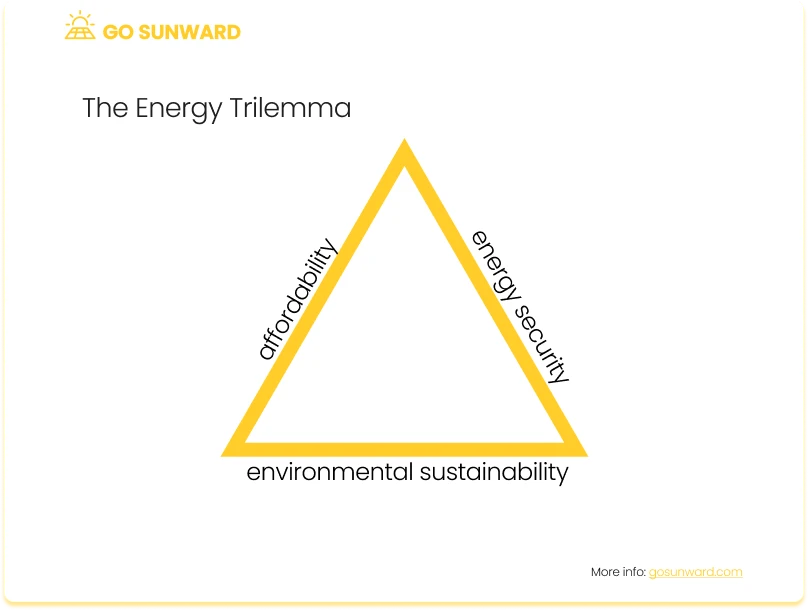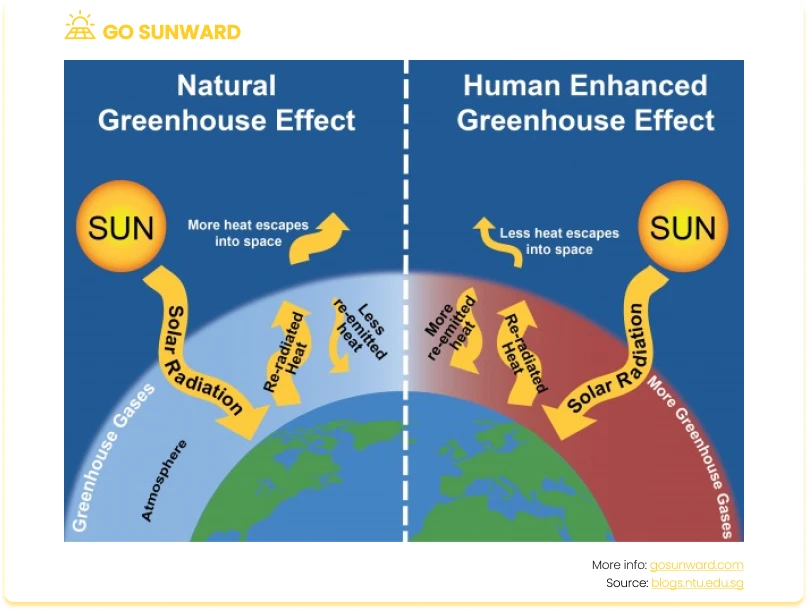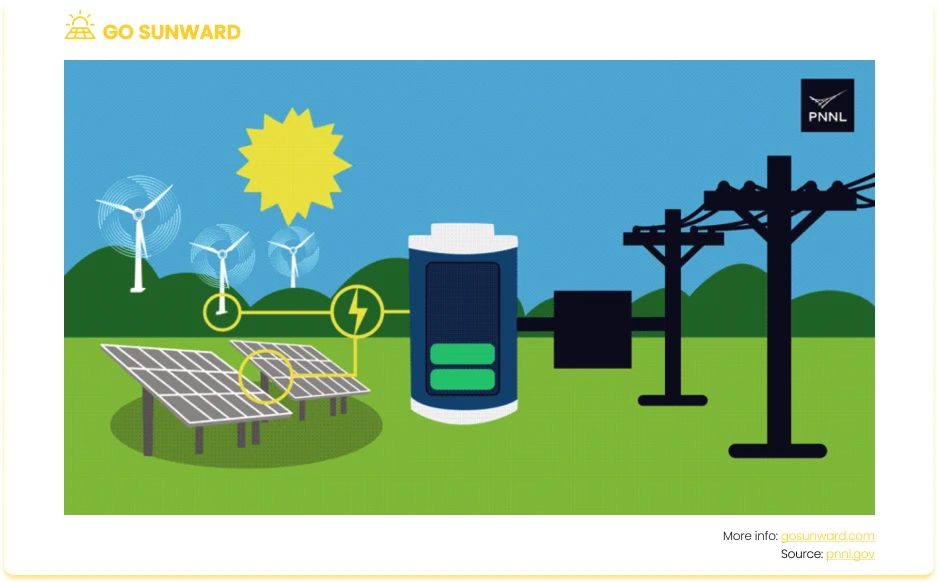Is It A Good Idea To Go Solar?
Solar energy has gained significant popularity as a sustainable alternative to traditional electricity sources and a key way to reduce electric bills. The prospect of harnessing solar radiation to generate electricity is undeniably appealing, but is it a good idea for everyone?
This article delves into the various aspects of going solar, exploring the benefits and considerations to help you make an informed decision on whether it is worth the investment. In most of this article we discuss the idea of going solar for residential and commercial properties, in other articles we cover How to support your ESG goals with solar as well as advice on apartment solar panels.
Is It A Good Idea To Go Solar? Exploring The Benefits
First, let’s look at some of the key benefits when switching your energy use to solar power. These are largely focused on environmental benefits, financial benefits (like the 2023 federal solar tax credit) and energy independence.

Environmental
Solar power represents a collective effort involving individuals, communities, and industries striving for a more sustainable energy future and a reduced carbon footprint. It’s a crucial step in addressing climate change and practicing responsible environmental stewardship. Solar energy, being a renewable source, plays a pivotal role in the fight against climate change by significantly reducing harmful greenhouse gas emissions. It also offers various environmental advantages, such as improved air quality, reduced water consumption in energy production, and the potential for land use conservation.
One of the most well-documented and compelling environmental benefits of solar power is its status as a carbon-free energy source. Unlike conventional fossil fuels, solar energy is clean and endlessly renewable. Panels generate electricity or heat without emitting any greenhouse gases like CO2 into the atmosphere. This characteristic makes solar power, alongside other low-carbon energy sources like wind and nuclear power, a potential game-changer in the global efforts to combat climate change.
Moreover, the adoption of solar panels for electricity generation and heating presents a potent means for individuals, businesses, and policymakers to significantly reduce their reliance on fossil fuels and offset their energy consumption. As the utilization of solar energy continues to grow, the dependence on electricity derived from fossil fuels naturally declines – this is how solar panels reduce CO2 emissions and playing a vital role in global efforts to combat climate change.

Cost Savings
Despite the upfront costs associated with solar panel installation, going solar offers substantial and enduring financial benefits. It can lead to significant long-term cost reductions and energy savings, potentially eliminating monthly electricity bills altogether. Additionally, many regions provide incentives, tax credits, and rebates to help offset the initial installation expenses, making solar adoption more financially accessible. Use our solar tax credit calculator to find out your own cost savings.
Investing in solar power promises highly attractive returns on investment (ROI) throughout the operational life of these systems. Technological advancements and declining costs have significantly shortened the payback period for solar installations. This means that you can recoup your initial investment quickly and start enjoying favorable financial returns from your solar energy system. Estimating your solar savings is not an exact science, but there are tools that can help you do it.
Energy Independence
Solar power allows homeowners and businesses to assume control over their energy generation, cultivating a sense of self-reliance that enhances both financial resilience and energy security. Through the utilization of solar cells and panels to capture the sun’s energy, individuals and companies can substantially reduce their dependence on external energy providers. Consequently, this reduces their exposure to supply interruptions and the influence of geopolitical factors that can lead to volatile energy pricing.
Furthermore, when coupled with energy storage solutions such as batteries, solar power systems offer an even greater level of resilience. These batteries allow excess energy to be stored during periods of high generation and utilized during times of low sunlight or power outages, further enhancing energy security and reducing reliance on the grid.

Is It A Good Idea To Go Solar? Things To Consider
So the benefits are clear, but let’s now turn to some of the key considerations when transitioning to solar power for your energy usage.
Environmental Considerations
The manufacturing process of panels involves using raw materials, energy, and transportation, all of which can potentially exert environmental impacts. Moreover, addressing the disposal of old panels at the end of their operational life becomes a concern if proper recycling and disposal procedures are not rigorously followed.
Although solar panels exhibit lifecycle emissions, stemming from various stages including production, transportation, installation, and eventual disposal, these emissions tend to be notably lower when compared with those originating from fossil fuel-based electricity generation over the typical 25 to 30-year solar panel lifespan.
Additionally, solar power actively offsets carbon dioxide (CO2) emissions from fossil fuels, substantially reducing net emissions. The “carbon payback period,” which signifies the time needed to counterbalance manufacturing and installation emissions, has considerably shortened thanks to advancements in cleaner manufacturing practices and more sustainable energy grids. This payback often amounts to just a few years, following which the solar panel continues to provide emissions-free electricity for several decades.
Intermittency
Renewable energy sources such as solar power and wind are known to rely on variables like weather patterns and sunlight, making them intermittent energy sources. These fluctuations in energy availability can pose challenges, particularly in maintaining grid stability and ensuring a consistent power supply for consumers and businesses. This aspect is essential to keep in mind when contemplating the use of solar power for residential electricity needs.
One effective solution for mitigating the challenges posed by intermittency in renewable energy is the utilization of energy storage technologies, such as Battery Energy Storage Systems (BESS). However, it’s important to note that implementing these technologies can come at a considerable cost, which needs to be factored into your solar energy decision-making process.
Energy storage systems like BESS can store excess energy generated during periods of high production and release it when energy production is low, providing a buffer against intermittent supply. While the initial investment in energy storage may seem substantial, it offers a valuable means to ensure a reliable and continuous power supply, even when renewable energy sources experience fluctuations. For more information on whether solar can really fully power a house, click here.
Initial Costs and Financing of Solar
A significant challenge revolves around the initial expenditure required for the installation of panels and the necessary infrastructure. Overall, the cost of the panels system can vary from a few thousand dollars for a small residential system to tens of thousands of dollars for a larger, high-efficiency system with energy storage. A typical residential panel installation in the United States might cost between $15,000 to $25,000 before incentives and rebates.
This upfront investment can pose a substantial obstacle, especially for smaller businesses and developing nations with limited financial resources. Nevertheless, governmental bodies and local authorities frequently provide financial incentives, such as tax credits, net metering, rebates, feed-in tariffs, and grants, aimed at promoting the adoption of solar energy. These incentives serve to alleviate some of the financial burdens associated with solar adoption.
The costs associated with renewable energy technologies, particularly solar power, have witnessed a remarkable decline in recent decades, rendering them an increasingly affordable choice for electricity generation. Our research indicates that this cost-reduction trend will persist in the coming decade, thereby reducing the barrier of prohibitively high costs. By 2030, for instance, the global weighted average levelized cost of electricity (LCOE) for solar photovoltaic (PV) is projected to decrease by 58% compared to 2018, further enhancing the affordability and accessibility of solar energy solutions.
Geographic Location
Additionally, understanding your location’s solar potential involves more than just assessing sunlight levels and weather conditions. Factors such as shading from nearby buildings or trees, the orientation and tilt of your solar panels, and local regulations and incentives can all play a role in the effectiveness of your solar installation. Conducting a comprehensive site assessment or enlisting the expertise of a solar professional can help you optimize your system’s performance and ensure you make the most of your investment.
Moreover, it’s important to consider the long-term benefits of solar energy within the context of your specific location. Some regions may experience peak energy demand during hot summer months when solar production is high, making solar particularly advantageous. In contrast, areas with inconsistent sunlight patterns may require additional energy storage solutions to maximize the benefits of solar power. Evaluating these factors can help you make an informed decision about whether solar energy is a suitable choice for your location and energy needs.
Space Constraints, Aesthetic Impact, and Home Value
Solar panels necessitate ample roof or ground space. In cases of limited space, meeting your energy needs might be challenging. Additionally, some individuals find solar panels unattractive, affecting their home’s visual appeal and potentially influencing its resale value. Nevertheless, the evolving solar panel market provides options to address both concerns. For more information on what type of panels are on the market today, click here.
Building-Integrated Photovoltaics (BIPV) seamlessly incorporates solar panels into roofing, windows, or facades, marrying energy generation with architectural design for an aesthetically pleasing solution that maximizes space efficiency. Carefully weighing these factors can help you determine the overall impact of solar installation on your home’s value.
Maintenance and Repairs
Regular maintenance of solar panels is crucial to maximize their lifespan and efficiency. While solar panels are known for their durability and low maintenance requirements, neglecting routine checks and necessary upkeep can result in reduced energy production over time. If you purchase solar panels from one of the USA’s top manufacturers of solar panels, you should also be covered with a guarantee meaning that maintenance and repairs isn’t a big thing to worry about.
Maintenance tasks may include cleaning dirt, debris, and bird droppings from the panels, inspecting wiring and connections for any signs of wear or damage, and monitoring the overall system performance. Some systems come with monitoring tools that can help you track your panel’s output and detect any anomalies promptly.
It’s essential to factor in these maintenance considerations when making the decision to go solar. While the upkeep is relatively minor compared to the benefits, being proactive about maintenance ensures that your solar panels continue to provide you with clean, reliable energy for many years to come.
Conclusion
Going solar can be an excellent idea for many homeowners, offering environmental benefits, cost savings, and increased energy independence. However, it’s essential to consider factors such as initial costs, geographic location, and solar maintenance requirements when making your decision. By weighing the pros and cons, you can determine if switching is the right choice for your home.




